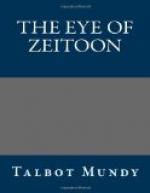We had laid both bodies under the one blanket in the shade, and Kagig pointed to them.
“I have found the place—the proper place, effendim!” he said simply. “Maga has made it fit.”
Not knowing what he meant by that last remark, we invited some big Armenians to come with us to carry our honored dead, and followed Kagig one by one up a goat track (or a bear track, perhaps it was) that wound past the crumbled and blackened castle wall and followed the line of the mountain. Here and there we could see that Kagig had cleared it a little on his way back, and several times it was obvious that there had been a prepared, frequented track in ancient days.
“It took time to find,” said Kagig, glancing back, “but I thought there must be such a place near such a castle.”
Presently we emerged on a level ledge of rock, from a square hole in the midst of which a great slab had been levered away with the aid of a pole that lay beside it. All around the opening Maga had spread masses of wild flowers, and either she or Kagig had spread out on the rock the great banner with its ships and wheat-sheaves that the women had made by night in Monty’s honor.
We could read the motto plainly now—Per terram et aquam—By land and sea; and Kagig pointed to some marks on the stone slab. Moss had grown in them and lichens, but he or else Maga had scraped them clean; and there on the stone lay the same legend graven bold and deep, as clear now as when the last crusader of the family was buried there, lord knew how many centuries before.
The tomb was an enormous place—part cave, and partly hewn—twenty feet by twenty by as many feet deep at the most conservative guess; and on four ledges, one on each side, not in their armor, but in the rags of their robes of honor, lay the bones of four earlier Montdidiers—all big men, broad-shouldered and long of shin and thigh.
We did not need to go down into the tomb and break the peace of centuries. Under the very center of the opening was a raised table of hewn rock, part of the cavern floor, about eight feet by eight that seemed to have been left there ready for the next man, or next two men when their time should come.
Down on to that we lowered Monty’s body carefully with leather ropes, and then Rustum Khan’s beside him, Rustum Khan receiving Christian burial, as neither he nor his proud ancestors would have preferred. But his line was as old as Monty’s, and he died in the same cause and the selfsame battle, so we chose to do his body honor; and if the prayers that Fred remembered, and the other cheerfuller prayers that Gloria knew, were an offense to the Rajput’s lingering ghost, we hoped he might forgive us because of friendship, and esteem, and the homage we did to his valor in burying his body there.
We covered Monty’s body with the banner the women had made, and Rustum Khan’s with flowers, for lack of a better shroud; then levered and shoved the great slab back until it rested snugly in the grooves the old masons had once cut so accurately as to preserve the bones beneath.




